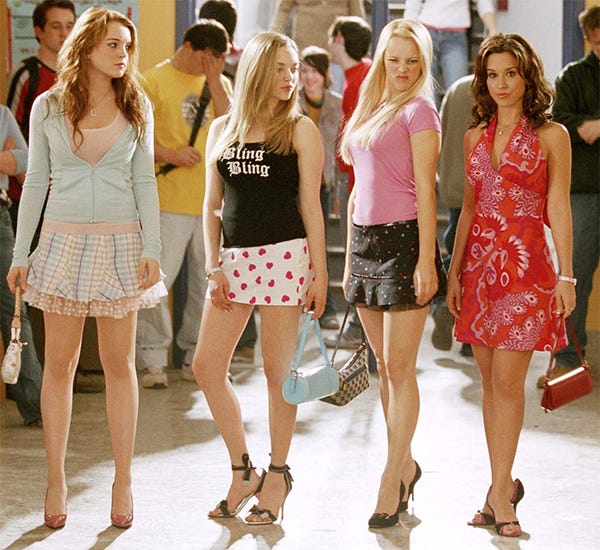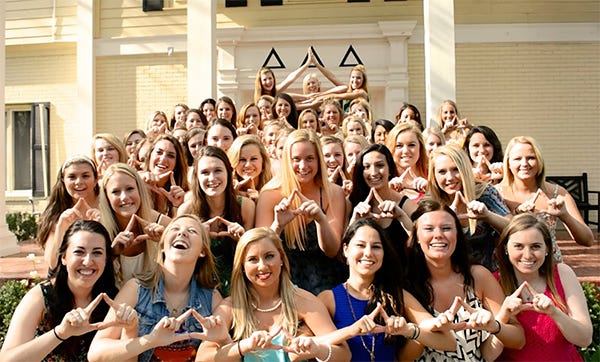A Violation of the Pecking Order
A few thoughts on what appears to be an important aspect of a female hierarchy
For some reason, I am often asked by women how they fit into the SSH. They don’t, I explain for approximately the 563,982nd time, because women are no more part of the male socio-sexual hierarchy than kittens, frisbees, or semiconductors. I would have thought this was readily apparent, given that “female” is intrinsically opposite to “male”, but for some reason, this concept manages to elude a surprising number of people, male and female alike.
A more intelligent pair of questions is a) if there is a female socio-sexual hierarchy and b) what it might be. I believe there probably is a female SSH of sorts, based on the pecking orders that reliably appear in even temporary groups of women, but I will not pretend to have any idea what it might be, as the more dynamic and chaotic nature of female behavior renders the observable patterns both unclear and unpredictable, at least to me.
There have been a few attempts to construct a female SSH, but thus far they have all proved abortive, and in most cases, even appear to illustrate an inability to understand what either a hierarchy or a behavioral pattern is. From what little I’ve seen, they tend to quickly devolve into discussions about mean girls who were not nice to the woman concerned at some point in the past.
However, what we can observe is that the female pecking order definitely has something to do with who is, and who is not, overweight, on the basis of this recent condemnation of all her former friends by a woman who dropped from 308 to 126 pounds over a period of 20 years, and in the process, shed all of her friends along with the 182 excess pounds she’d been carrying.
It was in my 40s — when I was finally thinner than the rest of my friendship circle and it was clear I was keeping the weight off for good — that they really started to be catty.
But I’m certainly not the only woman on the receiving end of snide remarks after dramatic weight loss. One friend toned up and lost 2st only to be told by her (now more portly) girlfriends that she looked ‘ill’.
Another gym-going acquaintance told me she was flagged down in her car by a ‘concerned’ neighbour who, unprompted, reprimanded her for losing far too much weight. Meanwhile, another was taken aside by her female boss, who asked if she had a problem with food. Her crime? Showing the girls in the office photos of her on holiday, post-diet, wearing a size 10 bikini.
One friend who had always been taller and slimmer than me sat me down and bluntly terminated our friendship when I reached the same size as her. She told me we had nothing in common any more. The irony was we could now have passed for sisters we looked so alike.
When I had the healthy option on a menu, I was accused of pushing ‘lettuce leaves’ around the plate. This felt unfair, as they knew only too well that unhealthy eating could trigger my binge-eating again. I believe their sly digs were their way of getting me to eat more. In fact, on some occasions when I was trying to lose weight, friends would buy me chocolates. I always put them straight in the bin, but would they give wine to an alcoholic?
Can you see a pattern here? A woman works hard to lose weight, begins to enjoy her shapely new figure and that’s when the cattiness starts. Clearly it makes other women feel bad about their own bodies: you can forget the sisterhood when it comes to slimming.
Perhaps the unfortunate truth is that every woman secretly wants at least one friend who is larger, or less attractive, than her as a way of making her feel better about herself. You may not like the way you look, but at least you can tell yourself you’re better than her.
So when said friend revamps their image, causing a potential shift in the pecking order, it causes hackles to be raised. Even those who don’t consider themselves to be at the ‘lower end’ of the spectrum experience some unease when another women within their social or work circle goes through this kind of obvious ‘glow-up’. It poses a risk to the delicate — and unspoken — balances of power.
I don’t believe that anyone is fully immune to these sort of feelings, whether you’re a size 6 or a 16. In fact, I’ve known perfectly slim women who felt the need to lose weight when a larger friend started shifting the pounds in order to maintain the ‘difference’ between them.
We don’t have to understand the hypothetical female hierarchy to grasp that upsetting the pecking order in one way or another causes social harm to the women who had previously been higher on the totem pole. So much harm, in fact, that it can apparently destroy both friendships and social groups.
Which, in turn, suggests that the female hierarchy, to the extent it exists in any meaningful sense, is more linear, more competitive, and fundamentally less stable than the male pyramid, where the elevation of a Gamma to Delta or a Delta to Bravo is likely to be welcomed by men who are higher in the hierarchy rather than greeted with outrage and passive-aggressive hostility.
But the vagaries of the female social order are outside male competence, and perhaps even male comprehension. So, we gladly leave it to women to sort out the manifold complications and chaos of whatever passes for their hierarchy as we continue to contemplate the growing number of useful applications of the male one.
UPDATE: It is becoming apparent that everyone who is attempting to construct a female SSH is coming at it backwards. Remember, every element of the SSH started as a taxonomical description. Attempting to model female social interaction on the basis of male behavioral patterns is akin to observing avian flock dynamics in order to determine how wolves fly.







There was a lady on Social Galactic that spiraled a couple years ago when Adele (the famous singer) lost weight. Not even close to being in the same social circle, but it still upset the apple cart.
Most men aren’t as interested in the female SSH as they think they are. The litmus test is this short story, a brief glimpse into the female SSH. Most men can’t make it through the story. When they do they are confused and a little annoyed. https://postcardsfromtheageofreason.com/2022/09/02/the-battleship-frances/
Perhaps you may have to add “youth” to the equation. Along with weight, this characteristic is the only other one I’ve consistently and reliably seen burrow under a woman’s skin. Sometimes it’s not even direct competition but the subconscious realization of “where you’re at”. Heartiste and the phrase “younger, hotter, tighter” comes to mind, as both an attractor to men and competition for women. A 40 year old alpha might take a 20 year old delta under his wing, teach him a few things. A 40 yr old woman will most likely disfigure a 20 year old female if she can find plausible deniability.